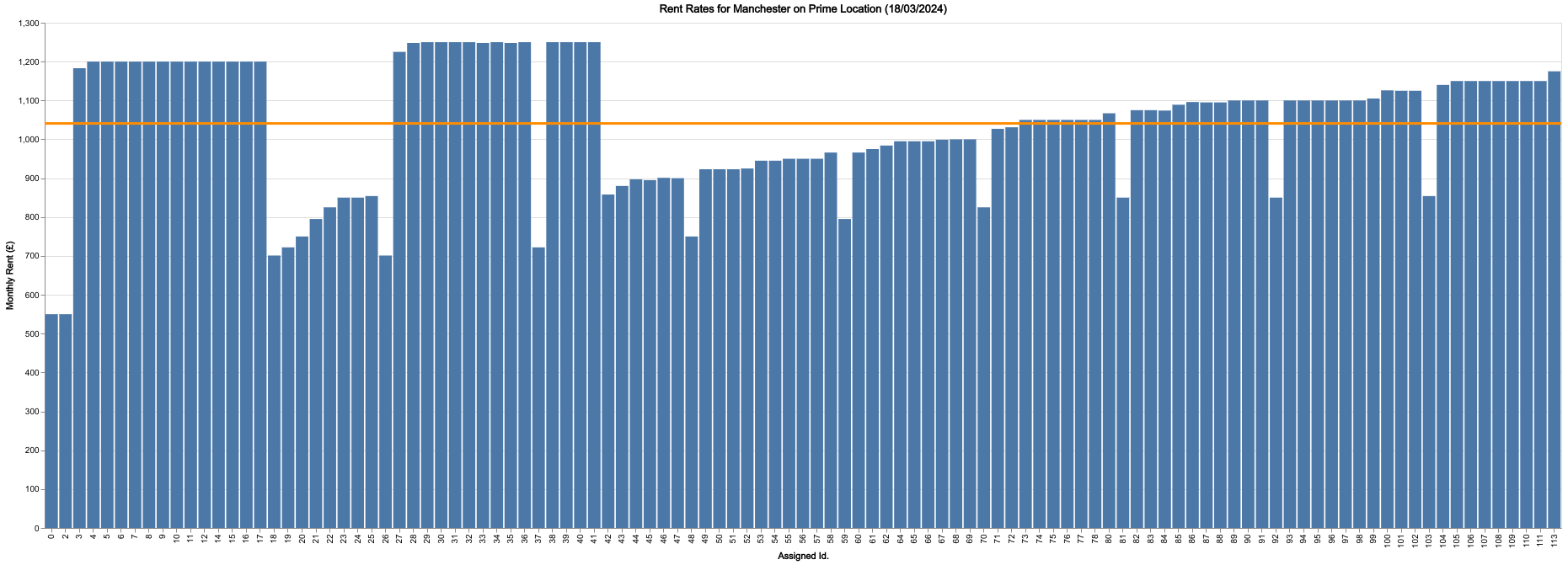10 KiB
Prime Location Manchester
- Setup Common Lisp Environment
- Gather Prime Location Data
- Clean Up and Parse Data
- Create CSV of Listings
- Explore CSV Data for Prime Location Manchester (2024-03-18)
- Summary of Prime Location
Setup Common Lisp Environment
I’ve copied the following code block over from other files. Run it if this is your first file open in the session.
(ql:quickload :com.inuoe.jzon) ; JSON parser.
(ql:quickload :dexador) ; HTTP requests.
(ql:quickload :plump) ; HTML/XML parser.
(ql:quickload :lquery) ; HTML/DOM manipulation.
(ql:quickload :lparallel) ; Parallel programming.
(ql:quickload :cl-ppcre) ; RegEx. library.
(ql:quickload :plot/vega) ; Vega plotting library.
(ql:quickload :lisp-stat) ; Stat's library.
(ql:quickload :data-frame) ; Data frame library eqv. to Python's Numpy.
(ql:quickload :str) ; String library, expands on 'string' library.Gather Prime Location Data
Having had a quick look at the website, it says there is 208 listings, spread across 11 pages. The search used the following filters:
- Date: 2024-03-18
- Location: Manchester City Centre, Greater Manchester
- Rent Listing Only
- Only monthly rents listed
- Price Range: £400–£1,250 pcm
- Include Shared Accommodation
- Radius: ’This area only’
Because of the amount of listings, I'm going to need to use curl and grab each
page separately.
There are not options to filter out ’student-only’ and ’bills inc.’ so this is going to be less accurate compared to other sites.
cd raw-data/external/
DIRECTORY="$(date '+%Y-%m-%d')-prime-location-manc"
mkdir $DIRECTORY
for PAGE in {0..11}
do
curl -o "$DIRECTORY/prime-location-$PAGE.html" \
"https://www.primelocation.com/to-rent/property/manchester-city-centre/?price_max=1250&identifier=manchester-city-centre&price_min=400&q=Manchester%20City%20Centre%2C%20Greater%20Manchester&results_sort=lowest_price&search_source=to-rent&radius=0&price_frequency=per_month&view_type=grid&pn=$PAGE"
sleep 5
done
# Change back to project's root directory, don’t want to call code whilst still
# in this directory. It'll probably cause errors.
cd ../../Clean Up and Parse Data
The usual separate each listing into its own file.
mkdir raw-data/external/2024-03-18-prime-location-manc-listings/ (let ((counter 0))
(loop for file-path
in (directory #P"raw-data/external/2024-03-18-prime-location-manc/*.html")
do (with-open-file (in-stream file-path)
(let* ((doc (plump:parse in-stream))
(listings (lquery:$ doc ".srp.grid-cell.grid-cell--left.grid-cell--big" (serialize))))
(loop for item across listings
do (let ((out-path
(merge-pathnames "raw-data/external/2024-03-18-prime-location-manc-listings/"
(format nil "listing-~a.html" (write-to-string counter)))))
(with-open-file (out-stream
out-path
:direction :output
:if-exists :supersede)
(format out-stream "~a" item))
(incf counter)))))))Create CSV of Listings
Build the CSV file from the listings files, as is the established way.
(with-open-file (out-stream
#P"working-data/2024-03-18-prime-location-manc.csv"
:direction :output
:if-exists :supersede)
(let ((row-id 0))
(format out-stream "ROW-ID,LOCATION,RENT,URL,DESCRIPTION~%")
(loop for filepath
in (directory #P"raw-data/external/2024-03-18-prime-location-manc-listings/*.html")
do (with-open-file (in-stream filepath)
(let* ((doc (plump:parse in-stream))
(raw-price (lquery:$ doc ".price" (text)))
(cleaned-price
(first
(cl-ppcre:all-matches-as-strings
"[0-9,]+" (aref raw-price 0))))
(link (lquery:$ doc "a" (attr :href)))
(address (lquery:$ doc "p a" (text)))
(description (lquery:$ doc "p" (text)))
(clean-desc
(string-trim " "
(cl-ppcre:scan-to-strings
".*\\.\.\." (aref description 4)))))
(format out-stream "~d,~a,~d,~a,~a~%"
row-id
(str:replace-all "," " " (aref address 0))
(str:replace-all "," "" cleaned-price)
(format nil "https://www.primelocation.com~a" (aref link 0))
(str:replace-all "," " " clean-desc))))
(incf row-id))))There are some results which state ’only for students’. So, I will need to filter them out.
Explore CSV Data for Prime Location Manchester (2024-03-18)
(lisp-stat:defdf *pl-manc*
(lisp-stat:read-csv #P"working-data/2024-03-18-prime-location-manc.csv"))#<DATA-FRAME:DATA-FRAME (114 observations of 5 variables)>
The original look at the data on the website states it was showing 208
listings. This count includes ad's (i.e. promoted) listings. These listing
have not been included in the processing of the data. Thus, *pl-manc* stating
is has 114 observations and not 208.
This list is going to reduced further, as the ’only for students’ listings need to be filtered out.
(lisp-stat:defdf *pl-manc-filt*
(lisp-stat:filter-rows *pl-manc*
'(not (str:contains?
"only for student"
description
:ignore-case t))))#<DATA-FRAME:DATA-FRAME (109 observations of 5 variables)>
So, only 109 listings after filtering, from 114. A reduction of 5 listings. The list is still too big to print out in this file, though.
(vega:defplot pl-mon-manc
`(:title "Rent Rates for Manchester on Prime Location (18/03/2024)"
:width 1800
:height 600
:data ,*pl-manc-filt*
:layer #((:mark (:type :bar)
:encoding (:x (:field :row-id :title "Assigned Id." :type :nominal); :axis ("labelAngle" 0))
:y (:field :rent :title "Monthly Rent (£)" :type :quantitative)
:tooltip (:field :rent)))
(:mark (:type rule :color "darkorange" :size 3)
:encoding (:y (:field :rent :type :quantitative :aggregate :average)
:tooltip (:field :rent :type :quantitative :aggregate :average))))))
(vega:write-html pl-mon-manc "renders/2024-03-18-prime-location-rent-manc.html")/craig.oates/overhaul2024/src/branch/master/renders/2024-03-18-prime-location-rent-manc.html
mv ~/Downloads/visualization.png ./renders/2024-03-18-prime-location-rent-manc.png

(format t "- Mean Rent: £ ~a~%" (float (lisp-stat:mean *pl-manc-filt*:rent)))
(format t "- Min. Rent: £ ~d~%" (reduce #'min *pl-manc-filt*:rent))
(format t "- Max. Rent: £ ~d" (reduce #'max *pl-manc-filt*:rent))- Mean Rent: £ 1040.8807
- Min. Rent: £ 550
- Max. Rent: £ 1250
1040 * 1212480
Summary of Prime Location
Based on the average rent for Prime Location, I would need to make around £13,000/yr to cover my living costs – not including the usual food, travel etc. expenses.
While I managed to apply filters to weed out the student-only listings, I wasn't able to filter out the listing which don't bills in the rent advertised. Because of this, these figure less accurate/consistent compared to some of the other sites I've looked at up to now. With that said, there is a good amount of listings here, compared to some of the other sites. So, hopefully, that can help offset some of the ’bills not included’ stuff.
Now, the usual ’survival mode’ stuff (add £5,000) onto the annual rent to pay.
12480 + 500017480
Using £17,480 as the starting point (see UK Wage and Tax Rated,
(let* ((earning-target 17480)
(p-allow 12570)
(taxable-income (- earning-target p-allow))
(tax-to-pay (* taxable-income 0.2))
(total (- earning-target tax-to-pay)))
(format t "- Annual Target Salary: £~a~%" earning-target)
(format t "- Part of Salary which is Taxable: £~a~%" taxable-income)
(format t "- Tax to Pay: £~a~%" tax-to-pay)
(format t "- Salary After Tax: £~a~%" total))- Annual Target Salary: £17480
- Part of Salary which is Taxable: £4910
- Tax to Pay: £982.0
- Salary After Tax: £16498.0
| Time Span | Value After Tax (£) | Mean Rent (£) |
|---|---|---|
| Annually | 16498.0 | 1040.88 |
| Monthly (Before Rent) | 1374.8333 | |
| Monthly (After Rent) | 333.9533 | |
| Weekly (After Rent) | 83.488325 | |
| Daily (After Rent) | 11.926904 |
Daily spend then is £11.93/day.